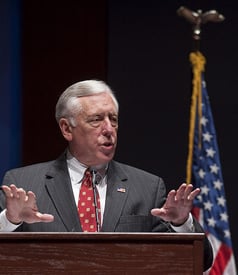Did you know that Truthout is a nonprofit and independently funded by readers like you? If you value what we do, please support our work with a donation.
Washington – The House of Representatives, in a stunning reversal, will not consider whether to give the District of Columbia full voting rights in Congress.
“The price was way too high,” explained House Majority Leader Steny Hoyer, D-Md., in announcing the decision Tuesday.
The House had been expected to begin a historic vote and debate on whether Washington would get a voting member of Congress. Currently, the city is represented by Delegate Eleanor Holmes Norton, who can vote in committees but not on the floor.
Hoyer would not specifically say what changed his mind. But liberals were objecting to a deal that would have attached a provision rolling back the city’s tough curbs on gun ownership. Senate legislation last year attached that amendment.
Others, though, were wary of a deal that would have also created another House seat for Utah, one of the country’s most Republican states. Washington has a population of 600,000 that is nearly 55 percent African-American and is heavily Democratic.
Washington residents have long complained of unequal treatment by Congress, which has power over District affairs even though it is governed by a mayor and a 13-member city council.
House leaders said last week that lawmakers would vote on the D.C. bill – delayed for more than a year – as early as Thursday, and Norton said at the time that voting rights supporters decided they could live with the gun control provision because the current bill might be the District last best chance to get voting rights because of the expected election of more Republicans to the House in November’s midterm elections.
“The Democratic majorities in the Senate and the House are already diminishing and are expected to be reduced even further,” Norton said. “Moreover, this is the first time we have had a president in office who will sign the bill along with the majorities in Congress to pass it.”
“I believe residents would not want us to pass up this once-in-a-lifetime opportunity for the vote they have sought for more than two centuries,” she continued.
But moving the bill as-is had opposition both inside and outside Congress. The League of Women Voters, a supporter of D.C. voting rights, said Monday that voting on the bill with the gun provision intact was “not acceptable.”
“The League of Women Voters believes that destruction of D.C.’s gun safety laws is too high a price to pay for passage of the D.C. Voting Rights Act, which would provide a single voting representative for D.C. in the House of Representatives,” league president Mary Wilson said in a written statement.
“There are two fundamental responsibilities that all elected officials must fulfill: protecting our democratic rights as Americans and protecting our lives and safety. Asking citizens to sacrifice their safety in order to have representation in Congress is unacceptable.”
In addition, Sen. Orrin Hatch, R-Utah, had threatened to filibuster the bill because he didn’t like the provision in it that would give his state an addition seat that would be elected on an at-large basis rather than having state official redraw congressional boundaries to create a new district.
“Utah deserves an additional seat in the House, but like every other state it should have the freedom to elect its members from regular districts,” Hatch said last week.
Hatch Tuesday applauded the House’s decision not to go forward with the bill.
“If the choice was between this deeply-flawed bill and no bill at all, no bill is hands down the better option,” he said in a statement. “This legislation made a mockery of our system of federalism by dictating to the State of Utah how it chooses its elected representatives. This type of arrogant, Washington-knows-best attitude is exactly why people are so angry, and why I’m glad this legislation will not move forward through the House.”
Hoyer, whose congressional district includes suburban Washington, said he was “profoundly disappointed,” adding the bill “should not be about the state of Utah or any other state. This legislation should be solely a central piece of American democracy.”
The bill, he said, “should be unfettered by other provisions.”
He would not completely write off its chances this year, but all but buried them, saying only, “I am hopeful sometime in the near future we should do so.” But with Democrats holding a nearly 80 seat majority in the House, and an 18 seat majority in the Senate, chances this year are considered the best they’ve been in years.
And Hoyer indicated he would not be open to much more amending. “The Congress of the United States has not dealt with this in a responsible way,” he said.
Trump is silencing political dissent. We appeal for your support.
Progressive nonprofits are the latest target caught in Trump’s crosshairs. With the aim of eliminating political opposition, Trump and his sycophants are working to curb government funding, constrain private foundations, and even cut tax-exempt status from organizations he dislikes.
We’re concerned, because Truthout is not immune to such bad-faith attacks.
We can only resist Trump’s attacks by cultivating a strong base of support. The right-wing mediasphere is funded comfortably by billionaire owners and venture capitalist philanthropists. At Truthout, we have you.
Truthout has launched a fundraiser, and we have only 72 hours left to raise $24,000. Please take a meaningful action in the fight against authoritarianism: make a one-time or monthly donation to Truthout. If you have the means, please dig deep.
